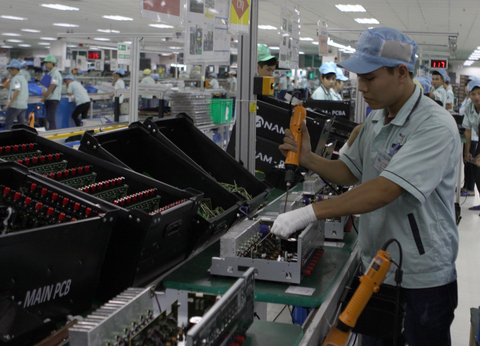
Workers of Electronics Vietnam Co Ltd assemble products for export at Dong Van 2 Industrial Zone in the northern province of Ha Nam. Local companies in export-oriented sectors including electronics are being weighed down by inequal business incentives. — VNA/VNS Photo Vu Sinh
Local companies are unable to compete with their foreign rivals in major export-oriented sectors such as electrical, electronics, computers, and machinery accessories manufacturing because of inequitable investment incentives.
“Domestic companies must pay import taxes on raw materials, machinery and equipment while foreign companies do not have to pay,” Pham Hoai Nam, deputy chairman of the HCM City Electrical and Electronics Engineering Association, told Sai Gon Giai Phong (Liberated Sai Gon) newspaper.
“Moreover, foreign enterprises investing in Viet Nam can enjoy a lot of concessions related to tax and land rents while local companies must pay all.
“These have created a gap between the prices of products made by local and foreign enterprises, giving no chance for [the former] to compete.”
The Government has many attractive investment policies for foreign investors, especially for manufacturers of end-user products.
But with authorities not clarifying which kinds of investments should enjoy such incentives, many investors have taken advantage to seek incentives for both their supply chains, including supporting industry companies, and manufacture of products for end users.
To address the inequitable situation, the HCM City Supporting Industry Development Centre has called for creating a fair business environment for supply chains.
“Incentives should be offered to end-user producers, not supporting industries. All FDI enterprises must pay the same taxes and fees as domestic ones,” a spokesman for the centre said.
Pham Van Tam, general director of Asanzo, said: “Domestic enterprises should review their internal strengths and choose the most appropriate product segment to enter.
He grumbled that while authorities said they would support local enterprises in developing supporting industries in production of end-user products, it is difficult for Vietnamese firms to source land or capital to expand production.
“If we can increase the rate of supply by local supporting industries, we can indirectly increase exports, narrow the gap between local and foreign firms, and limit export risks,” Nguyen Hoa Cuong, deputy head of the Ministry of Planning and Investment’s enterprise development department, said.
“Authorities should focus on assisting small and medium-sized enterprises to increase their competitiveness and promote their brands.”
According to the General Department of Statistics, in 2018 exports of electrical and electronic items, computers and machine accessories were worth US$100 billion, making Viet Nam one of top 20 exporters in the sector globally.
Of this, 95 per cent was by foreign enterprises though they depended overwhelmingly on imported parts with local sourcing accounting for a mere 10 per cent of their need. — VNS